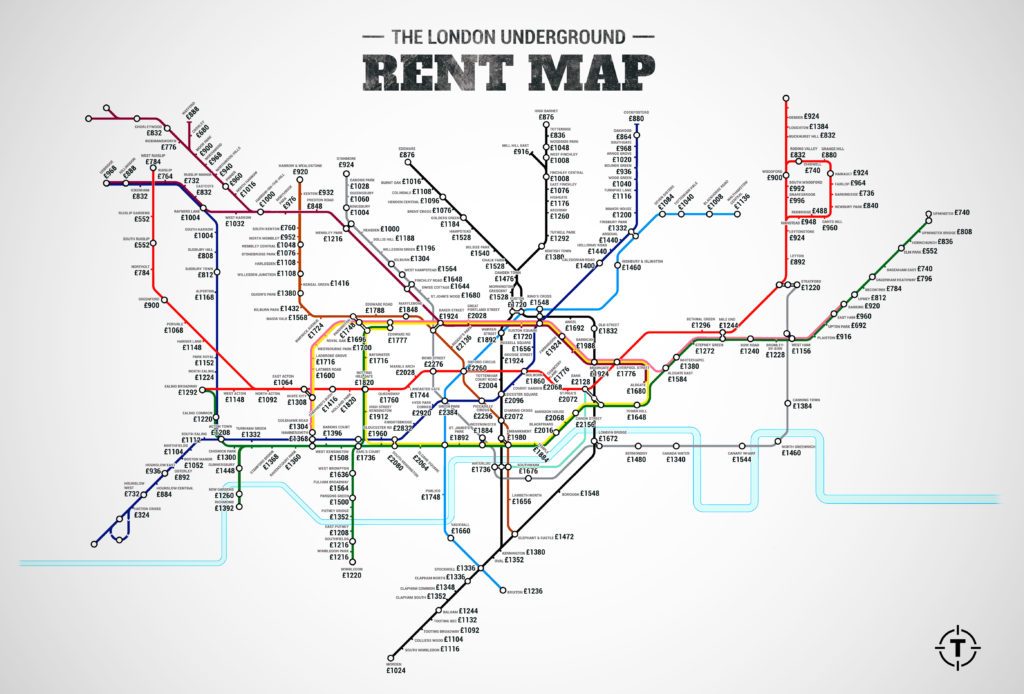Myth 3: I can get a much nicer (and bigger) house for my money elsewhere
This comment is like saying, “I can buy 25 bottles of Cava for the price of 1 bottle of Dom Perignon, so why would I buy the Dom Perignon?”
Yes, true, and you could buy a mansion in rural Bulgaria for the cost of a 1-bed flat in London, but the quality of living, local services and facilities will be non-comparable, not to mention the commute would be horrible!
So a rough guide to affordable renting/buying is below…
We all know that renting or buying a property is the largest expenditure you will face wherever you live, and in that respect London is no exception. Rents in London are on average the 18th most expensive globally. If you are moving by yourself and looking to rent in London, there are now numerous sources to find properties; with online services such as Airbnb monthly rentals and SpareRoom becoming increasingly popular. The property market in London is always booming and actually boasts one of the highest ratios of estate agencies-per-resident ratios, with 66.5 agencies per 100,000 residents, so there are always options available to you!
While there is an abundance of sources for properties, the exact cost really depends on the style of property you are after. While average prices in London can dip as low as £450 per month for a double bedroom flat share in North/West London, to rent just a one-bed property can cost as much as £1100 a month, with inner central London costing on average £1300 per month for a one-bed flat.
However, another great thing about London is the choice in location!! Many people when they move to a new city will already have a rough idea of where they want to live; be it close to work, friends or a favourite pub, for example. London boasts one of the world’s most efficient transport networks – which means you can live 30 miles away (where rent is cheaper), and only be a 30-minute commute from the city centre.
Another one for the pro-London list?
London has one of the best public transport systems in the world! You can travel by bus, tram, boat or tube, and for those of you considering a relocation with a family, children aged 0 – 11 travel for free on all Transport for London (TfL) transport.
The tube is traditionally the most popular form of transport in London, and by far the fastest and easiest way to travel; with some neighbouring stations (such as Covent Garden and Leicester Square) being only 260m from each other. However, other methods such as cycling are becoming increasingly popular, and with public-use ‘Boris Bikes’ on nearly every corner, it’s never been easier!
And briefly: what if you aren’t moving on your own?
Moving with your family? We would recommend renting for at least your first year in a new city, before committing to buying a property. On average, three-bed properties in London will cost anything from £1,312 pcm to a whopping £5,000 in areas such as Mayfair. To give you more of an insight, the link below has a more detailed guide to the cost of renting in London, with an interactive map, so you can narrow down options by location, cost and size.
london.gov.uk/what-we-do/housing-and-land/improving-private-rented-sector/london-rents-map
Myth 4: Taxes are too high
Tax, everyone’s favourite subject. (If you would like to spend the next 3 hours reading about taxation rates in the UK then I’ll refer you to the government website:
Browse: Money and tax - GOV.UK.)
But in simple terms: middle-class British (and London) residents – according to a survey done by
the Guardian in 2018 – actually enjoy some of the lowest overall taxation rates globally across all advanced countries – including Australia, the US and Europe (this includes comparing property, income and duty tax). And if you want to get really thrifty and pay less council tax every month, move to Wandsworth, Hampshire, or Hammersmith – residents pay some of the lowest council tax across the whole of the UK!
Do also bear in mind that the comparatively low tax you will be paying in London funds the free, world-class education for your kids, your free healthcare, as well as defence and police funding to ensure your safety too.
Myth 5: Brexit means Brexit!
Well that’s one myth I’m not even going to attempt to address, but suffice to say, nothing has changed and from what we are seeing nothing big will! But, if it does after our formal exit from the EU on 31st Jan, I’ll be back to add to this – in the meantime, if anyone needs further information there is a special section of the government website to answer all of your questions:
Brexit
Myth 6: It’s not my home country
While I’m not going to try and convince you that London will feel just like your home country if you move, London does boast one of the most ethnically diverse cultures in the world. Nearly every nation has a ‘home from home’ in London, whether that’s Russians in Kensington, Chinese in Chinatown or Brazilians in Bayswater. There are even Polish nightclubs and pubs selling only Polish beer, so while no, it is not your home country, city or town, you don’t need to look far to find your favourite flavour of pierogis anywhere in London.
If that’s still not as good as the real thing London has the busiest airport system in the world, with 6 major international airports in the city alone and another 34 across the UK. Combine that with as many as 9,000 flights leaving the UK a DAY in 2020, home is never too far (or too expensive) to get back to.
Visa Admin:
As of January 2020, there have been no changes to who needs one, and how to go about obtaining a working visa in the UK. If you require tier 2 sponsorship to work in the UK, then my advice is to speak to a recruiter or apply for jobs at bigger firms first.
If you are unsure whether you need a visa or an employment letter to work in the UK, or who in your family may need one, there is an easy questionnaire found here
Check if you need a UK visa, which should cover every possible nationality and scenario.
Myth busting: to sum up
Hopefully this has gone some way to dispel some of the myths around relocating and living in London as a tier 1 software engineer. If not, well there are a number of helpful guides here:
familymovingtolondon.com/,
expatforum.com/expats/britain-expat-forum-expats-living-uk/, which can help to answer any other questions or concerns you have.
In addition, if you are a software engineer and you are now interested in a move to London, then feel free to give us a call on 02031379570. We will be happy to tell you about the current market (and bust any other myths about London life you may have).
Is it worth relocating to London as a software engineer? - Oxford Knight







 .
.
.
